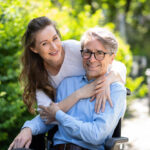
Elderly Care, Sacramento California
Dementia is a loss of cognitive capacity, memory, attention, and logical reasoning. These changes impair social or vocational functioning. Dementia has many causes. It occurs when learning, memory, decision-making, and language-processing brain areas are injured or diseased. The major neurocognitive disorder is another name. Alzheimer’s disease isn’t dementia. It’s a group of other illnesses’ symptoms. 5%-8% of over-65s have dementia. After 65, this doubles every 5 years. 50% of 80-year-olds have dementia. Alzheimer’s causes most dementia. Alzheimer’s causes 60-80% of dementia. There are 50 other dementia causes. Treating dementia may alleviate some of the symptoms suffered by the patient. However, many disorders that lead to dementia cannot be treated–but they can be managed with the help of a quality senior wellness residence.
Types of Dementia, Assisted Living, CA
These dementias can be treated to some extent, but cannot be cured:
- Alzheimer’s disease
- Vascular dementia
- Dementia from Parkinson’s disease and similar disorders
- Dementia with Lewy bodies
- Frontotemporal dementia (Pick’s disease)
- Creutzfeldt-Jakob disease
In terms of a brain region, dementia can be classified into two subtypes. Dementia is a disease that can damage either hemisphere of the brain. Dementia caused by Lewy bodies, for instance, affects both the cortex and the subcortex.
Dementias that originate in the brain’s outermost layer (the cortex) are called “cortical.” Memory and language rely heavily on them. The memory loss and inability to understand language typically associated with this form of dementia are severe. Cortical dementia includes Alzheimer’s and Creutzfeldt-Jakob diseases. Dementias of the subcortical variety are caused by dysfunction in subcortical brain regions. Individuals with subcortical dementias often experience alterations in their cognitive processing speed and their capacity to initiate new tasks. Subcortical dementia is characterized by a lack of memory loss and linguistic difficulties in its patients. Dementia of this type can be brought on by Parkinson’s disease, Huntington’s disease, or HIV.
Stages of Dementia, Sacramento, CA
These are the typical progressions associated with dementia. This, however, may be context-specific and dependent on the afflicted brain region.
- Totally unimpaired. There are no outward signs of illness at this point, although diagnostic testing may uncover an issue.
- The incidence of decrease is barely perceptible. Minor behavioral changes are possible, but your loved one will retain their autonomy.
- Modest decline. Observe how their reasoning and thought processes shift as time goes on. They may have problems organizing their thoughts and speaking in circles. Also, they can have trouble recalling recent happenings.
- Mild decrease. Their inability to plan forward and recall the recent past will worsen. They could have trouble with things like transportation and managing money.
- It’s a really serious downturn, actually. The names of their grandchildren or even their own phone numbers could be completely forgotten. They might not know what day it is or what hour it is. They are now at the stage in life where they require help with even the most fundamental of tasks, like deciding what to dress.
- Deflationary spiral. Their spouse’s name will start to slip their mind. They’ll require assistance with basic activities like eating and bathroom use. Their emotions and character may also be shifting.
- Declination to an extremely high degree. They have lost the ability to articulate their feelings. They will be confined to bed, unable to move, for the duration of their illness.
Best Senior Wellness Residence in Sacramento
To alleviate dementia symptoms, medical professionals will address the underlying cause. The good news is that you can often reverse the effects of about 20% of dementia’s causes. If a person’s dementia cannot be cured, then treatment will center on alleviating the symptoms, especially agitation and other emotional issues. Contact Jazba care in Sacramento, California, to learn more about our reputable senior wellness residence for patients with dementia.




